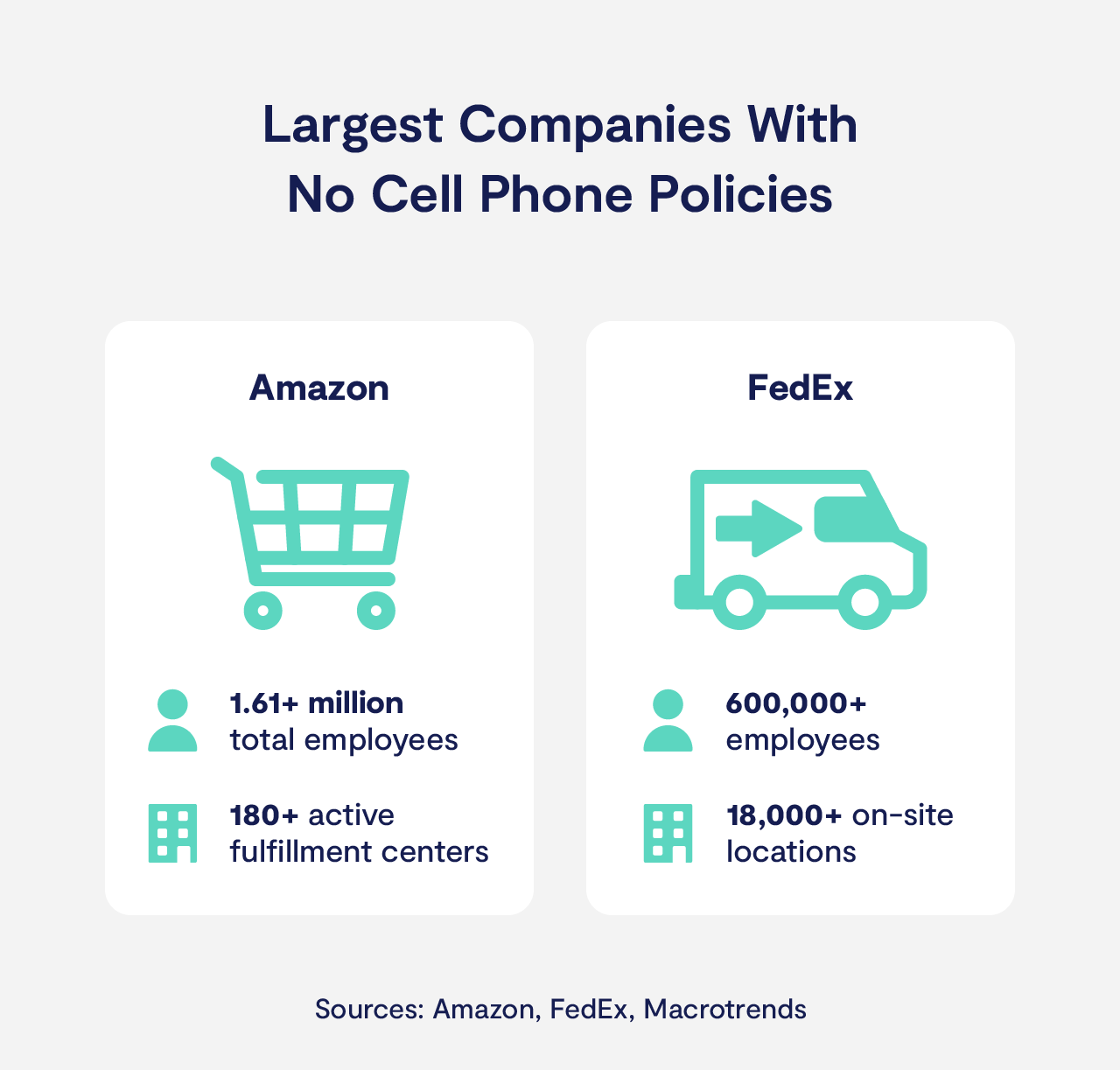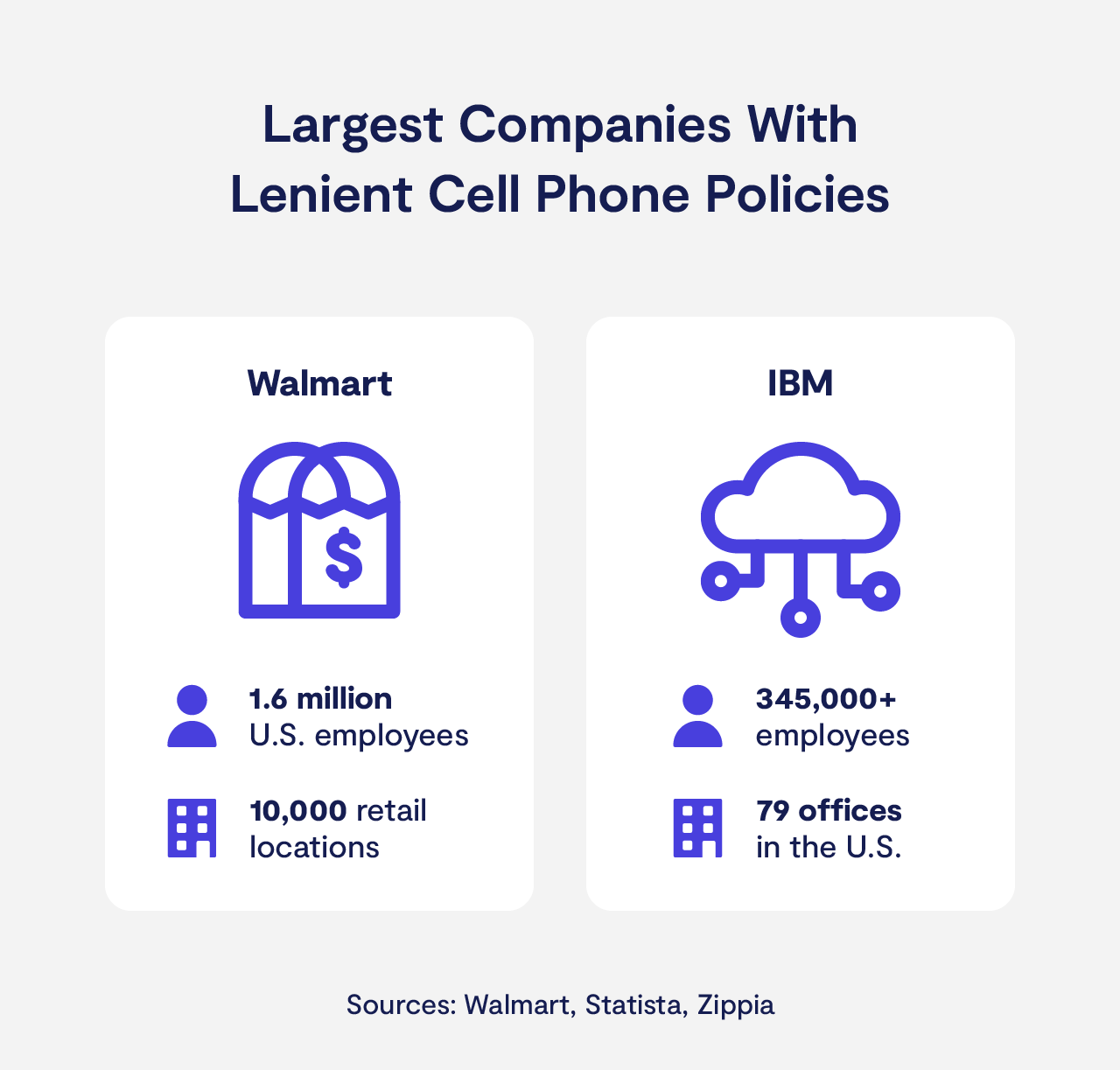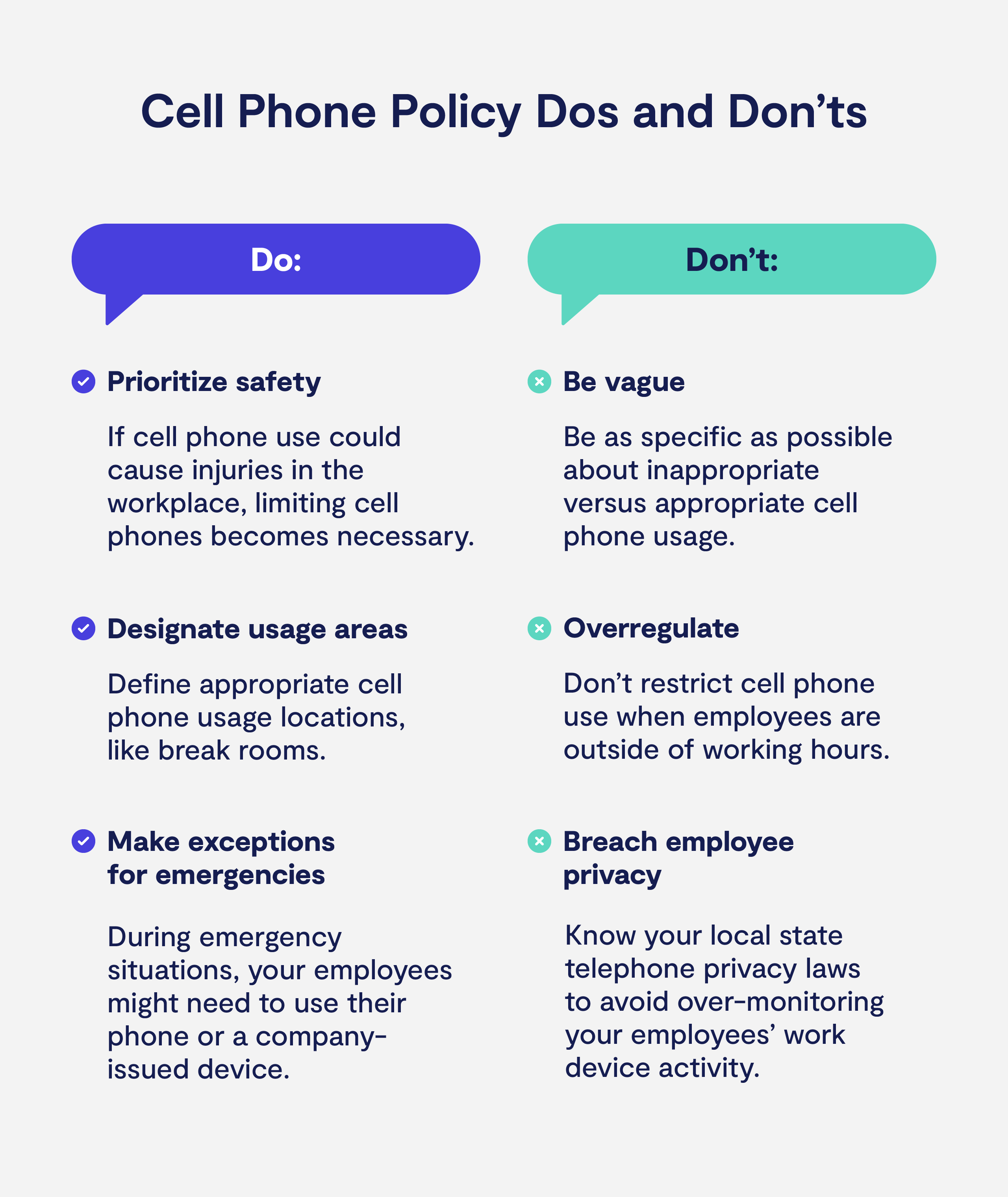As technology advances, our workforce becomes increasingly interconnected. We use our phones to take business calls, attend virtual meetings, and text updates to our boss. If you have a career in social media, mobile security, or ridesharing, your phone can be an integral part of your job.
Cell phone usage can also be a cause for security concerns and productivity issues. Only 48% of people password-protect their phones, meaning phone-use in the workplace could lead to leaked information. Additionally, smartphones can disrupt meetings or distract a workers while they’re operating dangerous machinery.
This means it’s sometimes necessary to implement a strict cell phone policy at work. But when cell phone policies are too strict, they can also put employees in danger.
For example, an Amazon warehouse recently collapsed from a tornado, resulting in the death of six employees. This brought the company’s no cell phone policy under scrutiny since employees could have received weather alerts if they had their phones on hand.
To gain a better understanding of typical U.S. cell phone policies, we analyzed the country’s largest employers and ranked states by how strict or lenient their typical workplace cell phone policies were.
Table of Contents:
- U.S. cell phone policies by state
- States with strict no cell phone policies
- States with lenient cell phone policies
- Companies that forbid cell phone usage at work
- Companies with lenient cell phone policies
- Corporate cell phone policy best practices
- Cell phone policy template
- Methodology
U.S. cell phone policies by state
To further understand company cell phone policies across the country, we gathered the cell phone policies of the top 10 employers in each state and categorized their public cell phone policies as either strict or lenient.
Based on our data, we determined the most and least cell phone-friendly states below.
- 1-9 (Very strict)
- 10-14 (Moderately strict)
- 15 (Neutral)
- 16-19 (Moderately friendly)
- 20+ (Very friendly)
Let’s take a look at our breakdown of the states with the most strict and lenient cell phone policies.
States with strict no cell phone policies
Our findings suggest that certain industries are more prone to strict cell phone use policies. For example, trucking companies, airlines, and factories often institute cell phone bans for safety reasons.
| Least cell phone-friendly states | ||
|---|---|---|
| State | Employee count | CPF score |
| Kentucky | 1.94 million | 1 |
| Illinois | 5.93 million | 2 |
| Maryland | 2.99 million | 2 |
| Alabama | 2.17 million | 4 |
| California | 17.61 million | 6 |
| Source: Bureau of Labor Statistics, 2021 | ||
Fast food companies and retail stores also often have strict cell phone restrictions for the sake of minimizing distractions.
For this reason, states with an abundance of grocery and fast food employers, such as Kentucky and Illinois, stand out as some of the least cell phone-friendly states.
States with lenient cell phone policies
The majority of companies across the country allow their employees to bring their iPhones and Androids to work. While companies might restrict personal use of mobile devices while on the clock, employees still typically have access to their cell phones in case of emergencies.
| Most cell phone-friendly states | ||
|---|---|---|
| State | Employee count | CPF score |
| Wisconsin | 3.02 million | 23 |
| North Carolina | 4.73 million | 22 |
| New York | 8.83 million | 22 |
| Iowa | 1.61 million | 22 |
| West Virginia | 750,000 | 21 |
| Source: Bureau of Labor Statistics, 2021 | ||
We found that some of the most common industries reliant on cell phones are the medical and financial industries. This means that states with large banking, healthcare, and tech companies, such as New York and Wisconsin, topped our list as some of the most cell phone-friendly states.
Companies that forbid cell phone usage at work
Some of the largest employers in the U.S. are known for banning cell phone usage completely at work. Below are two of the most notable companies with strict cell phone policies

Sources: Amazon, FedEx, Macrotrends
Both Amazon and FedEx have received public backlash for their strict workplace phone policies. Let’s examine these controversies in more detail below.
Amazon
Amazon’s ban on cell phones in warehouses has gone back and forth in previous years. While the ban was lifted during the height of the pandemic, it was reinstated in 2021.
Shortly thereafter, a tornado caused a deadly warehouse collapse in Illinois, prompting the policy to come under fire. The tragic event called into question the safety of restrictive cell phone policies in general.
While Amazon has since backtracked on its plans to reinstate a cell phone ban, it remains a good example of why nuanced workplace policies are important.
FedEx
FedEx also made headlines for its no cell phone policy after a tragic incident occurred at one of its facilities in Indianapolis. This event left families of FedEx employees worried as they were unable to contact their loved ones.
In an interview with IndyStar, FedEx spokesman Chris Allen said that the cell phone policy is based on workplace safety and is in the best interest of company employees.
Whether you’re for or against employee cell phone usage, it’s worth taking these cases into consideration when developing a policy.
Companies with lenient cell phone policies
We found that certain companies allow employee cell phone use to the extent that it becomes part of the work culture.

Sources: Walmart, Statista, Zippia
While some companies ban cell phones at work to increase productivity, Walmart and IBM encourage cell phone usage with the same end goal in mind.
Walmart
Walmart is the largest grocery chain in the U.S. with over 1.6 million employees and 10,000 retail locations worldwide.
While there was a time when the company banned the use of cell phones across stores, now employee cell phone usage is embraced.
Walmart recently announced that it is providing over 740,000 employees Android phones to help with clocking in, scheduling shifts, and communicating with one another.
IBM
As a leading IT and mobile security company with over 345,000 employees, IBM is also integrating employee cell phone usage into its culture.
The company’s "Bring Your Own Device" (BYOD) policy encourages employee use of personal smartphones, laptops, and wearables at work. According to IBM’s website, the employees' use of personal devices "empower[s] them to do their best work."
In these examples, each company saw potential upsides of cell phone use in the workplace. As mobile technology advances and becomes more useful, it’s possible that more companies will follow suit.
Corporate cell phone policy best practices
Your cell phone policy will likely vary depending on your company. To create a policy specific to your business, here are some best practices to follow.

Other important cell phone policy best practices include:
- Prohibiting cell phones while driving
- Prohibiting cell phone use while operating machinery
- Securing smartphones at work to avoid being tracked
- Outlining emergency situations where cell phones are allowed
- Designating areas appropriate for cell phone use, such as the break room
- Providing specific examples of inappropriate cell phone use at work
When cell phones carry company information, online privacy breaches can be dangerous. Make sure all work devices are secured using antivirus and VPN software when necessary.
Cell phone policy template
Your cell phone policy should be specifically tailored to the needs of your company. If cell phones could endanger the safety of employees, it might be best to restrict them. If phones could enhance safety and productivity, then the opposite approach might be better.
No cell phone policy example
There are some instances where strict cell phone policies are necessary. Here’s an example of a brief no cell phone policy:
"Personal Device Usage Policy:
For reasons of safety and to limit workplace distractions, it is the policy of [COMPANY] to limit the use of personal devices.
Prohibited personal items include cell phones, headphones, radios, pagers, bluetooth devices, etc., and may not be used or worn by employees during working hours or in work areas."
While this is a good example of a general no cell phone policy, it’s also a good idea to be specific about why cell phones are prohibited. Your reasoning will depend on your company.
If you’re running a transportation company, for example, then you may want to prohibit employee cell phone usage while driving to reduce the risk of car accidents.
If you’re prohibiting phones to increase productivity or to minimize workplace distractions, simply say so. If that’s the case, you may want to consider issuing your employees a company-owned device to use for emergencies.
Limited cell phone use policy example
If you see value in allowing cell phone usage at the workplace, you may want to implement a more lenient policy like the one below.
"Personal Device Usage Policy:
Use of personal devices such as cell phones and other technologies should be limited to [COMPANY]-related business purposes.
There may be times when non-business-related calls or texts must be made or answered during working hours. Such calls are permitted so long as they are held to a minimum and do not interfere with workplace productivity."
Remember, just because you’re lenient about cell phone use doesn’t mean that you’re encouraging it. If you’re allowing employees to use personal devices, you still want to discourage excessive use.
Mobile devices can be both helpful and harmful, which is why developing a well-thought-out cell phone policy is a must. Examining our data and examples above will help you develop a policy best suited for your company.
Workplace devices should always be secured with the right anti-tracking software and spyware removal tools. Clario’s services can help keep your invaluable company information protected.
Methodology
To determine the cell phone friendliness of each state, we compiled a list of each state’s 10 largest companies and examined the cell phone policies of each company.
In employee handbooks, company forums, and codes of conduct, we found that company policies were either “cell phone-friendly” meaning that workers could use their phones at their own discretion, “cell phone antagonistic,” meaning that no cell phones were allowed to be used at work, or “cell phone neutral,” meaning they didn’t have a public policy in place either for or against cell phones.
To weigh cell phone friendliness, we gave each company an initial score of 15, indicating that a company is cell phone neutral. For every cell phone-friendly policy counted, we’d add a point to the score. For every cell phone antagonistic policy we recorded, we’d subtract five points. For every company without a public policy, we’d count it as a zero, leaving the score the same.
This means that if Arkansas had 10 cell phone-friendly companies, it would have a total score of 25, making it the maximum level of cell phone friendliness. If a state had three cell phone-friendly companies, one cell phone antagonistic company, and six cell phone neutral companies, the final score would add up to 13, or moderately friendly.








